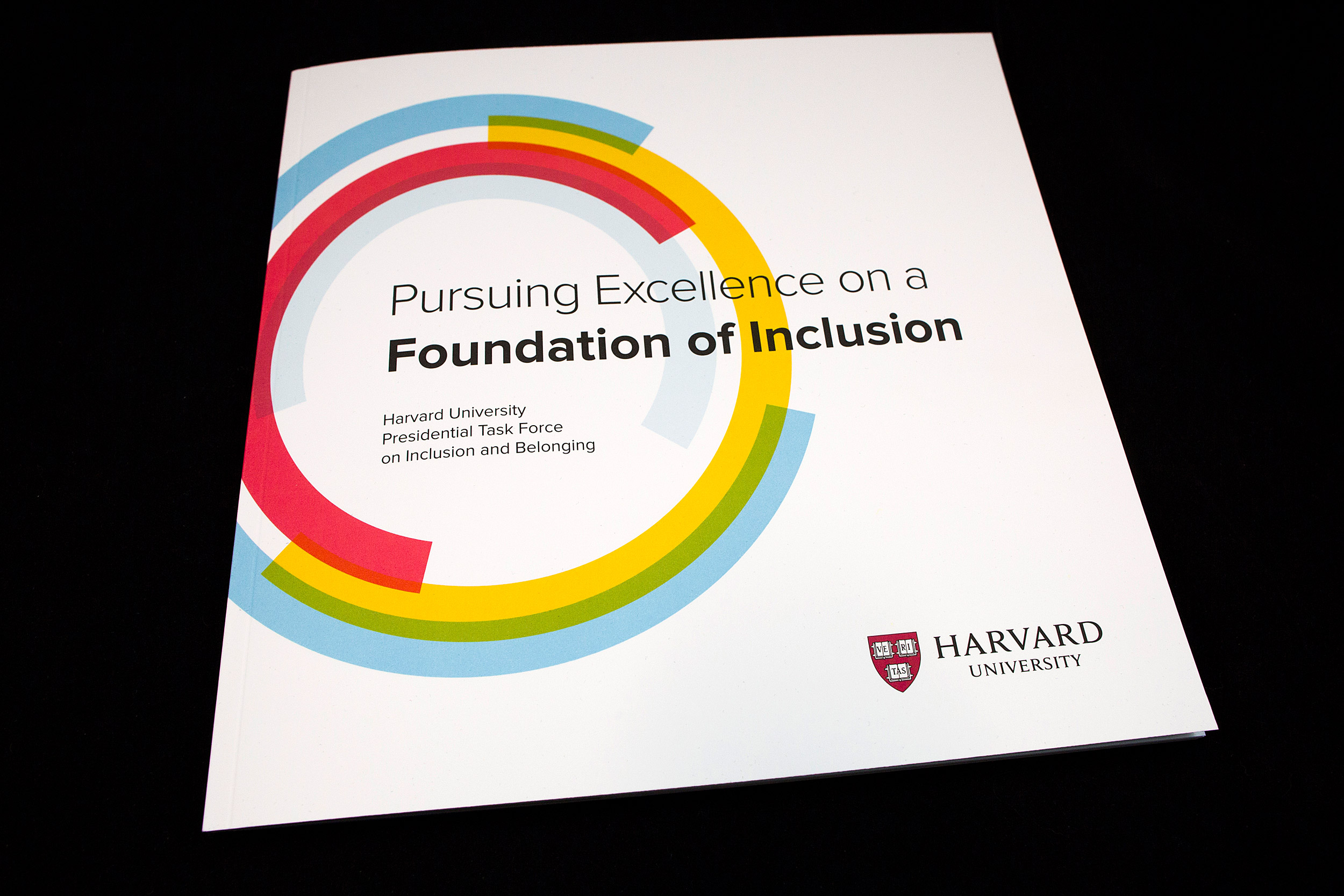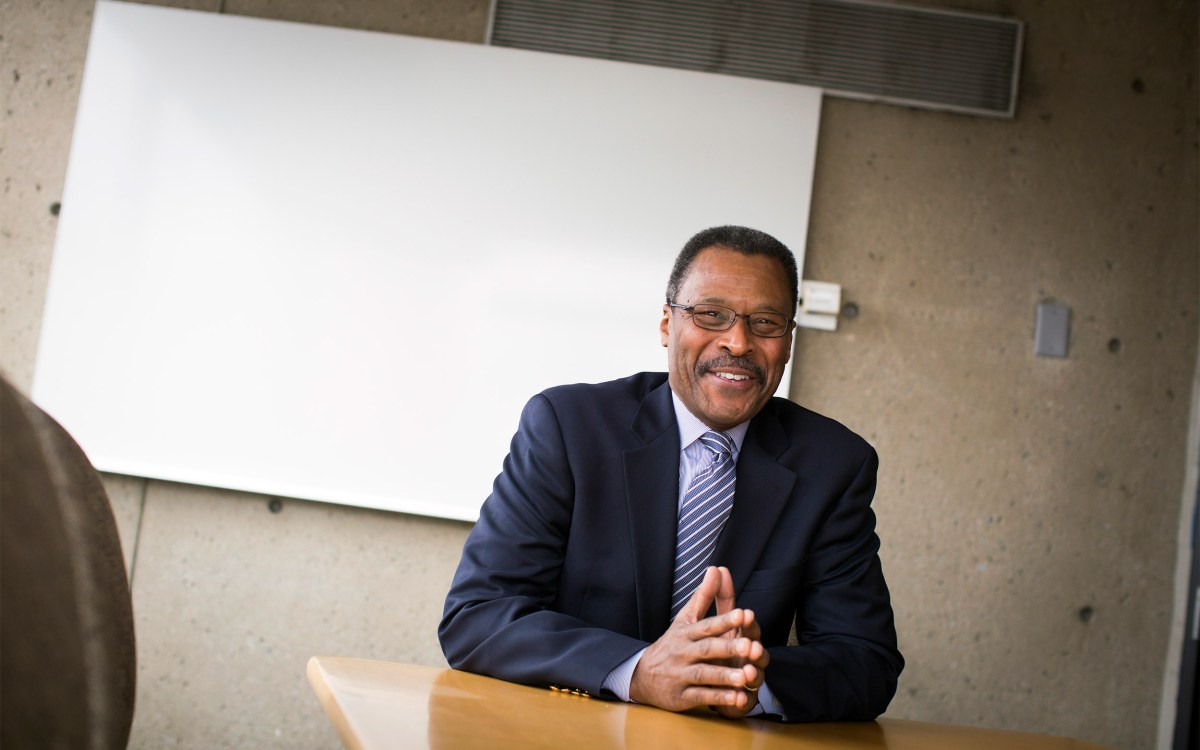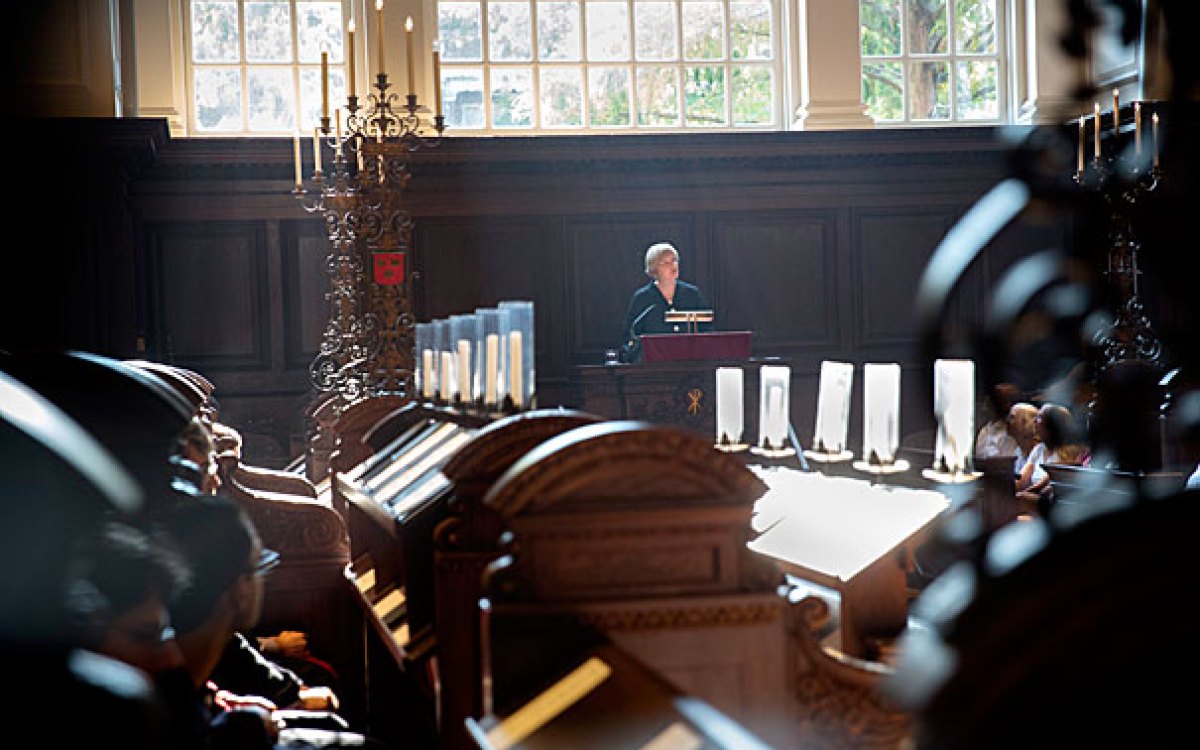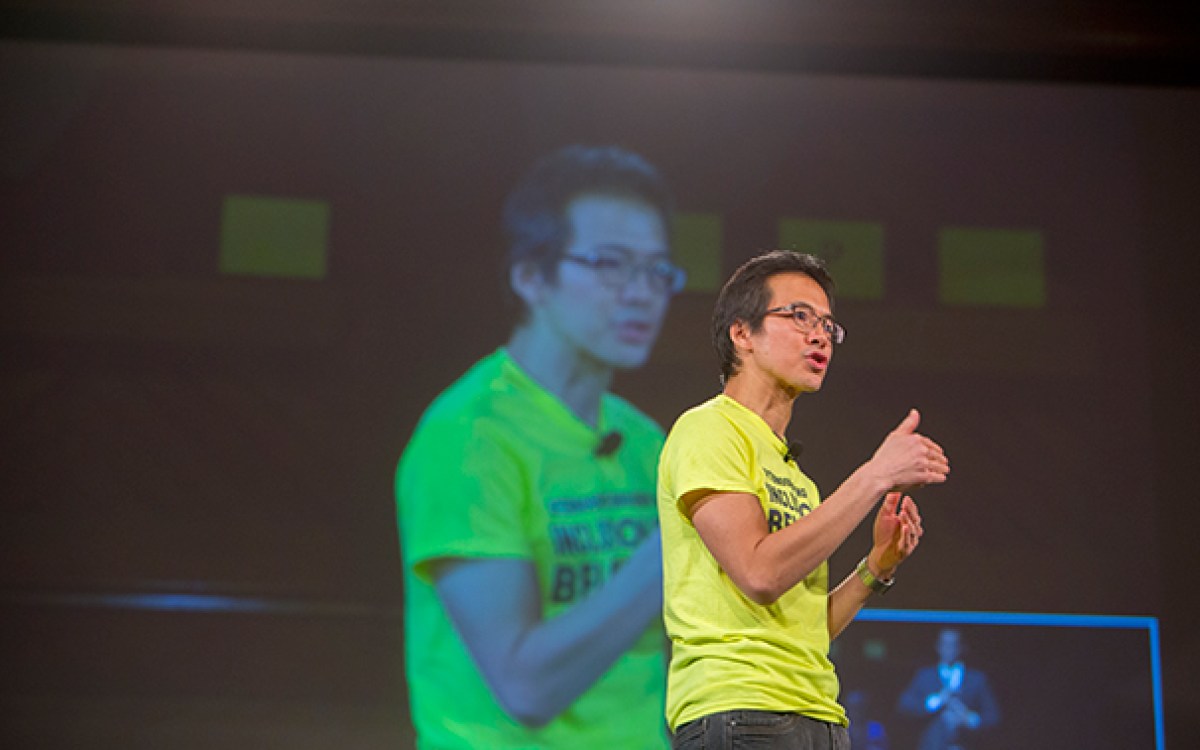
In its final report, Harvard’s Presidential Task Force on Inclusion and Belonging included eight recommendations and a framework of “four goals and four tools.”
Report issued on inclusion, belonging
Task force outlines recommendations, goals, and tools, while Faust announces initiative to advance efforts
Harvard’s Presidential Task Force on Inclusion and Belonging issued its final report today, a compilation of eight recommendations and a framework of “four goals and four tools” meant to serve as a blueprint for advancing Harvard’s practices and culture of inclusion and belonging. In response, Harvard President Drew Faust announced a series of initiatives to advance this work, including development of an innovation fund, resources for faculty renewal, and regular forums in the Smith Campus Center.
“Harvard’s commitment to excellence in the advancement and dissemination of knowledge rests upon the foundation of the remarkable people who make up this community,” Faust wrote in a letter to the community.
“I am deeply grateful for the extraordinary work of the task force and for the insightful, ambitious, and inspiring approaches reflected in its report,” she said.
Faust has also appointed John Silvanus Wilson as senior adviser and strategist. Wilson’s primary responsibility will be “to serve as a point person during the presidential transition in bringing the task force report to life and ensuring its enduring impact.” A former president of Morehouse College, former head of the White House Initiative on Historically Black Colleges and Universities, former senior administrator at Massachusetts Institute of Technology, and a member of Harvard’s Board of Overseers, Wilson is intimately familiar with the rhythms and values of higher education, Faust said.
“He is distinctively able to ensure that Harvard’s efforts to create a truly inclusive environment for all of its members, guided by the task force report, bear full fruit,” she wrote.
The task force, co-chaired by James Bryant Conant University Professor Danielle Allen, director of the Edmond J. Safra Center for Ethics; Harvard Kennedy School Academic Dean Archon Fung, the Winthrop Laflin McCormack Professor of Citizenship and Self-Government; and Vice President for Campus Services Meredith Weenick, was made up of 60 student, staff, faculty, and academic personnel from across the University. Members met monthly to go over draft recommendations and reports, while subcommittees focused on specific areas such as outreach, academic resources, and organizational structures. They also met extensively with School leaders and focus groups of students, faculty, and staff to gather data on current campus conditions. They hosted an Afternoon of Engagement last spring and launched an online “Solution Space” to solicit ideas from the community on how to make the campus a more welcoming place for people from all backgrounds.
The task force also launched a competition to revise Harvard’s alma mater to make it more inclusive. From more than 100 entries, a judging committee selected a submission from Janet Pascal ’84 to replace the last line of “Fair Harvard” with “Till the stars in the firmament die.”
“We are extremely grateful for the enthusiastic participation of so many members of the Harvard community throughout this process,” Weenick said. “From the task force members who spent so many hours formulating these ideas and discussing how to best do this work to the many, many members of the Harvard community who attended the Afternoon of Engagement last spring, shared suggestions via the Solution Space and submissions for the alma mater competition, as well as reviewed drafts, this report and the task force’s work are truly a community product.”
The report recommends that the Office of the President and Provost:
- Revise the symbols and spaces at Harvard to make them more inclusive, including revising the University values statement, adding public art, and increasing the number of maps and signs to help newcomers navigate campus.
- Develop two interfaculty initiatives, one on identity, politics, and culture, and one on inclusion and belonging in higher education.
- Continue to focus on ensuring that the University’s mental health services address the needs of the evolving and increasingly diverse community.
- Ask each School and business unit to identify several priority areas that each regards as most important for inclusive excellence, and articulate how those priorities will be advanced.
- Reorganize its approach to providing central support for work on diversity, inclusion, belonging, and campus community for students, staff, and faculty, and academic personnel.
- Focus the University’s human resources increasingly on enabling staff talent and improving organizational culture.
- Enhance the reliance on institutional research capacities, and make regular reports on key demographic features of students, staff, faculty, and academic personnel in all academic units.
- Increase resources for faculty renewal and development.
“In developing our recommendations, we sought to identify the highest-impact initiatives that could be undertaken by the Office of the President and Provost,” Allen said. “But we also sought to engage Schools, business units, and the entire Harvard community in a set of shared aspirations and concrete strategies for realizing them that were developed organically out of smart thinking from all across campus.”
The final report includes a framework of four goals for pursuing excellence on a foundation of inclusion:
- Implementing practices that promote the recruitment, retention, and development from the widest possible pool of exceptional talent.
- Achieving forms of academic, professional, and social integration that enable community members to be their authentic selves while supporting their academic and professional growth.
- Uniting academic freedom with a culture of mutual respect and concern.
- Conveying, through symbols and spaces, the values of excellence, inclusion, and openness and how those values both grow from and transcend history.
“This framework is meant to be a guide to help leaders develop strategies that create inclusive and welcoming teams, organizations, and cultures,” Fung said. “We also seek to leverage and inspire the collective enterprise of the Harvard community in moving this work forward by outlining the core values of the Harvard community, and encouraging individuals to think intentionally about what these values mean and how they might personify them.”
The task force also recommended four tools to use to work toward achieving these goals:
- Leadership ready to partner in this work with all campus constituencies.
- Institutional capacity for ongoing strategic planning and implementation.
- Aligning responsibility with authority.
- Processes of data transparency and dialogue to promote learning and accountability.
“All of these tools are already in use by different groups across campus,” Fung said. “However, we recommend that they be used more systematically, with more coordination, in a process of continuous improvement. We also hope that they will prompt dialogue between different Schools and units about best practices and innovative ideas.”
Faust convened the University-wide task force in September 2016 to identify ways to help the University ensure that all members of its community find an environment on campus that supports their academic and professional success. With Faust stepping down as president at the end of this academic year, the task force accelerated its work to give her time to consider its recommendations.
Faust’s response to the report was immediate. In consultation with her successor, Lawrence S. Bacow, she announced a dozen action items today that will continue the work of diversity and inclusion on campus. Her initiatives include additional funds for innovation, faculty recruitment, and mental health services, further assessment of public art and signage on campus, and tasking various stakeholders with convening working groups to address organizational structures, pedagogy, and additional ways to address inclusion and belonging in higher education.
“The responsibility of building community does not alone belong to a task force or to a university president; it is incumbent on all of us to do our part, to reach across difference, to find ways to ensure that every person on this campus has the chance to find intellectual, professional, and social fulfillment,” Faust wrote. “Harvard’s leadership — our boards and senior academic and administrative personnel — is committed to these goals as foundational to all that Harvard is and does, and we anticipate working with you to advance these efforts in the days and years to come.”







